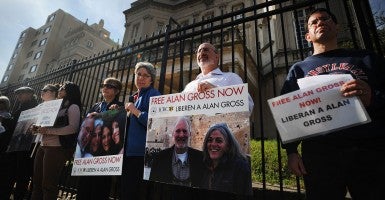Cuba’s release of American hostage Alan Gross is to be welcome. Gross has vegetated in a Cuban jail for five years for the crime of bringing computers to Jews on the island.
But exchanging three hardened Cuban spies for him establishes a wrong moral and legal equivalency. Worse, extending recognition to Cuba’s dictatorial regime harms U.S. national interests and fails to advance freedom in Cuba.
The White House “Fact Sheet” on Cuba makes clear that the Obama administration received nothing in exchange for its many and substantial concessions to Havana’s Communist regime. In essence, after five years of “negotiations,” the White House ended up where Raul Castro started: Gross would be exchanged for three Cuban spies whose activities led to the death of an American in the 1990s.
The administration’s announcement that “the president has instructed the secretary of state to immediately initiate discussions with Cuba on the re-establishment of diplomatic relations with Cuba,” also gives in to a longstanding Castro demand. Cubans will not gain freedom of expression, of association, of thought or of anything else as a result.
The Obama administration received nothing in exchange for its many and substantial concessions to Havana’s Communist regime.
Moreover, the White House’s explanation that it was acting because “U.S. policy towards Cuba has isolated the United States from regional and international partners,” shows degrees of fecklessness that should put fear into Israel and other allies for which American support brings condemnation of the U.S. at the United Nations and other international fora.
Obama obviously has decided to act on his own because he faced little opposition from Congress when he overreached his authority and acted on his own by giving amnesty to 5 million illegal immigrants. Congress needs to act now, or Obama simply will move on to the many other items on his bucket list.
Congress must make it abundantly clear to Obama that he does not have the authority to lift the embargo on Cuba on his own. Doing so would break U.S. law, namely the Helms-Burton Act.
Senators also should make clear they will not allow the appointment of an ambassador to Cuba to proceed until there have been changes on the island and look into the possibility of using policy riders in the upcoming Department of Homeland Security appropriations debate in February and the fiscal year 2016 appropriations process to deny the president funds for setting up relations.




























